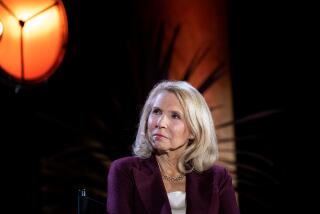Viacom execs at top in media pay
- Share via
Even in the most rarefied echelons of executive compensation, media mogul Sumner Redstone and his top lieutenants are in a league of their own.
Philippe Dauman, chief executive of Viacom Inc., last year earned the distinction of drawing the largest compensation package in corporate America: $84.5 million. That was a 149% jump from the previous year, lifted by a one-time stock and options award totaling $54.4 million, which came courtesy of signing a new five-year employment agreement to run the company that boasts such prominent cable TV channels as MTV, Nickelodeon and Comedy Central and Hollywood movie studio Paramount Pictures.
Dauman’s second-in-command, Thomas E. Dooley, received $64.7 million. His take, also boosted by a nearly $41 million one-time stock and options bonus tied to the signing of a new contract and added responsibilities, represented a 139% increase from his 2009 pay. The Viacom chief operating officer’s compensation was even six times higher than for a typical CEO in the U.S.
Dauman’s and Dooley’s salaries covered only nine months of work, rather than a full year, because Viacom changed its fiscal calendar midyear to align it with the TV season.
At Redstone-controlled broadcasting giant CBS Corp., CEO Leslie Moonves reaped $57.7 million, including a $27.5-million bonus. His package, an increase of 34% over the previous year, also included $2.5 million to cover taxes he paid in New York, where CBS is based and where he maintains a home. Moonves’ primary residence is in Los Angeles, and he frequently works out of CBS’ West Coast complex in Studio City.
Both Viacom and CBS turned in strong performances last year. But in good years and bad, pay packages for media CEOs have eclipsed those for other captains of industry — except oil barons and Wall Street bankers. The 30 highest-paid media executives in the U.S. made an average of nearly $22 million last year, an increase of 13% over 2009, according to a survey by Redwood City, Calif., executive compensation research firm Equilar Inc. In contrast, the norm for CEOs of Standard & Poor’s 500 companies last year was $10 million.
Several factors contribute to the outsize salaries of media bosses. Corporate governance experts chalk up the phenomenon to the so-called star effect. Chiefs don’t want to make less than the talent they employ. CBS, for example, pays daytime syndication star “Judge Judy” Sheindlin more than $40 million a year.
In addition, many media companies started as family-owned businesses, and the founders have preferred stock with increased voting rights, which gives them even greater sway in decision-making.
The large wage earners at Viacom and CBS dramatically outpaced the chiefs at much bigger media companies. Walt Disney Co.’s Robert Iger received a $29.6-million package in 2010; Time Warner Inc.’s Jeffrey Bewkes made $26.3 million, and 80-year-old Rupert Murdoch, the lion of News Corp., earned $22.7 million.
But 88-year-old Redstone, who monitors his companies’ affairs from his Mediterranean-style mansion above Beverly Hills, has them beat. Redstone has been collecting paychecks from two companies since the 2006 corporate breakup of Viacom that divided his empire into two pieces — Viacom and CBS. As executive chairman of both companies, Redstone pulled in $35.3 million last year.
That’s a considerable boost from his salary before the breakup. In the five years before Viacom split, the compensation for Redstone, then the CEO, was $17 million to $24 million annually.
Viacom defended the packages.
“An overwhelming majority of the total compensation of Viacom’s senior named executive officers is in long-term equity awards that align their interests with those of our stockholders,” the company said in a statement. “Annual compensation for all of Viacom’s executive officers reflects the achievement of double-digit growth in operating income, adjusted net earnings and total shareholder return.”
Experts said checks and balances dealing with executive pay do not appear to be priorities within Redstone’s sphere. Investors are largely powerless to demand reforms. Redstone, through his family investment firm National Amusements Inc., controls 79% of the voting stock of each of his two companies, which gives him wide latitude to manage Viacom and CBS as he sees fit.
“There is very little that investors can do when companies like these are so tightly controlled,” said Paul Hodgson, senior research associate with GovernanceMetrics International Inc., an independent corporate governance research firm.
Last year, Viacom and CBS shares soared, along with the rest of the market. Viacom’s common stock climbed 27% during the nine months covered in the company’s fiscal year. Viacom posted net earnings for continuing operations of $1.18 billion, an increase of 23% for the comparable period in 2009. On Wednesday, Viacom hiked its quarterly dividend 67% to 25 cents a share, signaling the company’s healthy finances.
In 2010, CBS shares also went on a tear, increasing 36% as television and radio station revenues swelled along with the resurging advertising market. CBS’ net income last year leaped 220% to $724.2 million. CBS said Moonves’ pay “reflects the fact that he led CBS to results that produced extraordinary growth in shareholder value, and outpaced both the industry and the company’s internal targets.”
Yet watchdogs have raised concerns about Redstone’s pay practices.
At Viacom, “there is a long-term misalignment between executive pay and company performance,” proxy advisory firm Institutional Shareholder Services Inc. said in a recent report.
ISS noted that Dauman’s compensation package represented about 12% of Viacom’s net income for its last fiscal year. Using the same metrics, Iger’s compensation would equal less than 1% of Disney’s net income.
“Shareholders may have concerns with the stewardship and effectiveness of the board’s compensation committee,” ISS said of Viacom.
Viacom called ISS’ comparison misleading, saying it was based on “an inflated calculation that does not comply with generally accepted accounting principles.” It noted that Dauman’s stock options were not exercised in 2010, would vest over several years and could potentially lose value.
Not surprisingly, the media companies that account for the highest pay — Viacom, CBS, Comcast Corp., News Corp. and Discovery Communications Inc. — all have a dual-class stock structure. Those companies’ founders, including Murdoch and Comcast’s Roberts family, hold shares with extra voting rights.
Murdoch’s annual base salary of $8.1 million, for example, is the highest of any media CEO.
“The ultimate motivation for having dual-class shares is control,” said Raffi Amit, an academic director at the Wharton School at the University of Pennsylvania and an expert in family-run companies. “They want to use other people’s money to finance their business, but they don’t want to give up control.”
Comcast chief Brian L. Roberts, whose father, Ralph J. Roberts, co-founded the giant cable company, is near the top of the 2010 media list with a $31.1-million package, a 14% increase from 2009. His longtime No. 2, Stephen Burke, now CEO of Comcast-controlled NBCUniversal, made even more — $34.7 million.
Last year, David Zaslav, chief of cable programming company Discovery Communications, had the biggest compensation jump. His package ballooned 265% to $42.6 million, in large part because of the growth in Discovery’s stock. Still, that made Zaslav’s compensation 44% higher than Iger’s, even though Disney is 10 times larger than Discovery, last year generating $38 billion in revenue. Discovery, meanwhile, brought in $3.8 billion in revenue.
More to Read
Inside the business of entertainment
The Wide Shot brings you news, analysis and insights on everything from streaming wars to production — and what it all means for the future.
You may occasionally receive promotional content from the Los Angeles Times.











